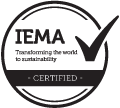Carbon Footprinting and Reporting Training Course
DURATION
1 dayCPD
Equivalent to 7 hours CPDCERTIFICATES
All delegates will receive a certificate on completion.DELIVERY OPTIONS
Course certification

Learn about carbon quantification techniques that provide the basis for developing and reporting an organisational carbon footprint on this IEMA certified Carbon Footprinting and Reporting training course.
It also addresses the background to climate change and the drivers for taking action, and provides overview of key terminology.
Through engaging modules and workshops delegates will learn how to develop a footprint strategy, quantify carbon emissions, communicate the information internally and externally and, where relevant, prepare for external assurance.
Click to read the Carbon Footprinting and Reporting course flyer.
- any individual involved in the practical tasks of developing carbon footprints
- anyone with responsibility for managing the process
There are no formal entry requirements, although it is beneficial if individuals have some prior knowledge of environmental issues and management.
Individuals wanting a greater understanding of emissions reduction and the pathway to net zero should consider also attending the IEMA certified Pathways to Net Zero training course which is scheduled to run immediately after this course. A £95 discount is applied when booking both together.
- the background to climate change
- climate change and climate action terminology
- drivers for carbon quantification
- carbon quantification standards and schemes
- principles and techniques of carbon quantification, including
- establishing inventory boundaries
- determining sources of data for Scopes 1, 2 & 3
- applying emissions quantification approaches
- communicating carbon data
- reducing emissions and Net Zero
- WELCOME AND INTRODUCTIONS
- Module 1 Introduction and background
- Module 2 Drivers for carbon footprinting and reporting
- Exercise 1 Drivers for developing a carbon footprint
- Module 3 Carbon quantification standards and schemes
- Module 4 Principles and techniques of carbon footprinting and reporting
- Exercise 2 Your organisation’s scope 3 emissions
- LUNCH
- Exercise 3 Selecting emission factors
- Exercise 4 Sources of scopes 1 and 2 emissions
- Module 5 Communicating carbon data
- Module 6 Reducing emissions and Net Zero
- CLOSE
- Course assessment – to be completed after the course
- explain the background to climate change and the drivers for taking action
- identify the key standards for carbon footprinting and reporting
- understand their relevance to their organisation and its objectives
- plan and implement a carbon footprinting and reporting process
- undertake or supervise carbon quantification tasks
- prepare carbon data for reporting
- understand the need for and benefits of good data quality and verification
Upcoming course dates










The Institute of Environmental Management and Assessment (IEMA) promotes sustainable development through training to enable improved environmental practice and performance. As an approved training partner, we at Bywater have demonstrated the ability to deliver training that can make a real difference to organisations, and as a result can benefit from the support services provided by IMEA.
This carbon footprinting course is designed to complement our 2-day IEMA certified Pathways to Zero training course. The two courses are scheduled to run together in our training calendar.
We additionally offer other IEMA approved training courses on waste management, sustainability skills for the workforce and for management, and a Foundation Certificate in Environmental Management.
While not a requirement, it will help understanding if delegates already have some knowledge of environmental issues and their management. Practical experience is an advantage.
Our IEMA certified Pathways to Net Zero training course is scheduled to run in the 2 days following this course, and offers an explanation of net zero and ways to reduce emissions.
Carbon quantification refers to the process of measuring and determining the amount or concentration of carbon, typically in various forms, within a given sample or system. Many businesses conduct carbon quantification to assess their environmental impact, comply with regulations, and implement sustainability initiatives.
Yes, if you complete the course you will receive a certificate which you can share with your employer and colleagues, add to your CV, and upload to professional platforms such as LinkedIn. The certificate demonstrates your commitment to continuing education and your new knowledge about the increasingly important topic of carbon management.
Customer reviews
EDF Energy Ltd|9th Jul, 2025
Summit Environmental|30th Jun, 2025
Environment Agency|18th Jun, 2025
Subsea 7 UK Ltd|16th Jun, 2025
Oxford Brookes University|13th Jun, 2025
Tetra Consulting Ltd|12th Jun, 2025
EDF Energy Ltd|12th Jun, 2025
Royal College Of Psychiatrists|11th Jun, 2025
London Fire Brigade|10th Jun, 2025
TATA Steel|10th Jun, 2025
Hemsley Fraser Deutschland Gmbh|26th May, 2025
Costain Ltd|14th May, 2025




